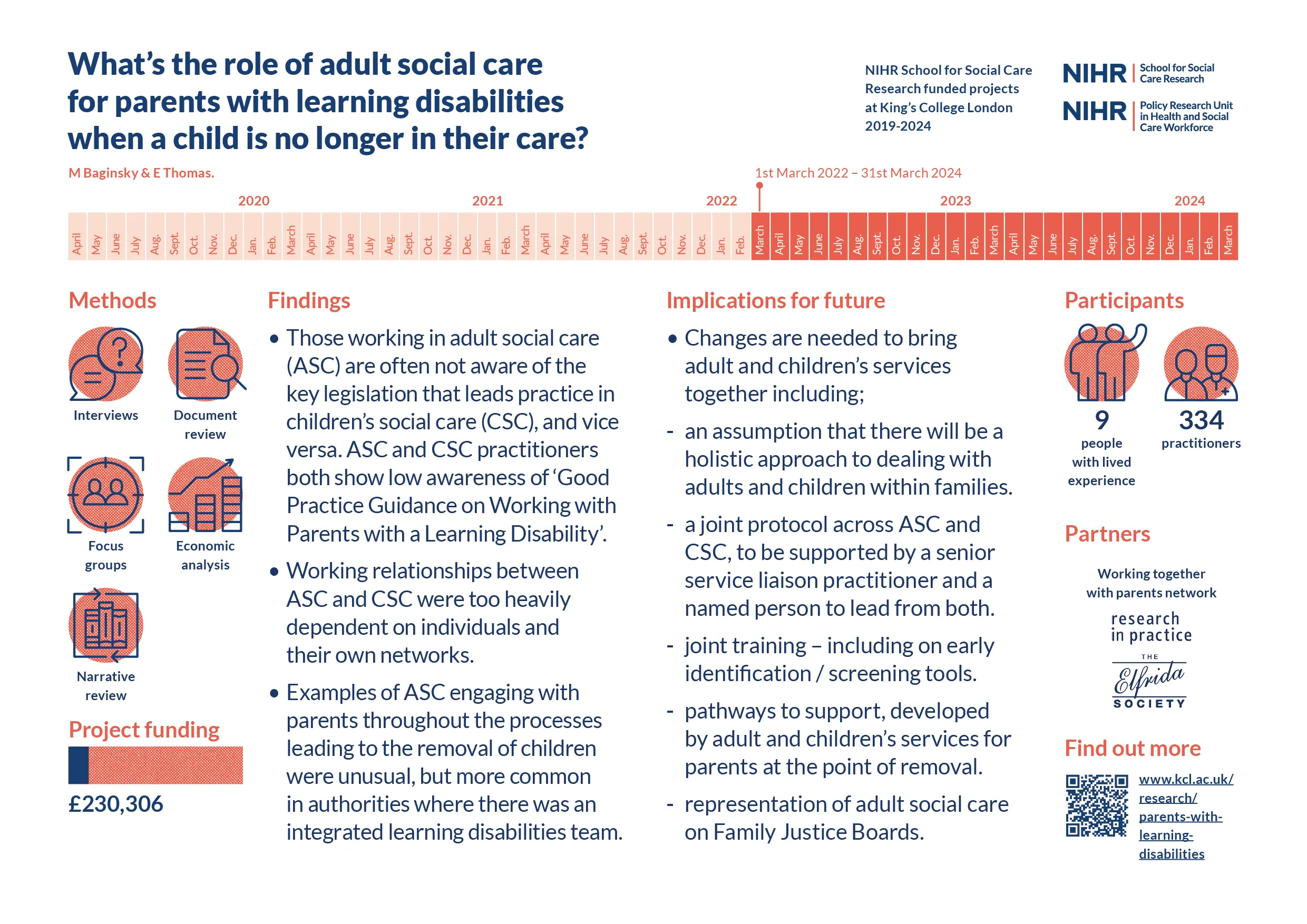The role of adult social care for parents with learning disabilities when a child is no longer in their care


Animations
Animation 1: The Visit (4min 44sec, YouTube): This study of the experiences of parents with a learning disability when they were in contact with children's social care (CSC) and family courts found that social workers often failed to recognise a parent's learning disability and / or to know what to do about it or where to seek support for them selves and the parent. Without this parents may face multiple referrals to CSC without appropriate help ever being provided and sometimes risk being subject to more intrusive responses at a later stage. This animation is intended to help social workers be curious about the needs of parents with a learning disability and to seek advice if they are not sure what are the next steps. It was made by My Pockets in collaboration with HSCWRU at King's College London, Mencap Cymru and Pause, Southwark.
Animation 2: The Clouds (4min 56sec, YouTube): While there are a number of cases where judges have provided advice on how to conduct proceedings where a parent with a learning disability is involved, this animation is intended to remind those working in family courts that these parents have a right to support and that it should be in place. It was made by My Pockets in collaboration with HSCWRU at King's College London, Angela O’Callaghan of Mencap Cymru, Celeste Greenwood, a barrister from Exchange Chambers, and Amy Harrison, an intermediary practising in North Yorkshire.
Download the infographic at the top of this page (PNG) | Download the infographic for all the Unit's NIHR SSCR-funded work 2019-24 (PDF)
About this study
The study had the following aims:
- Record what is known from research and practice about the support - or lack of – that is available to parents with learning disabilities (LD) who have children removed following court proceedings.
- Identify models of practice in local authorities and in specialist services.
- Explore the contact between Adult Social Care and Children’s Social Care over this group of parents.
- Capture the views of parents and advocates on their experiences of removal and the support that was available and / or required at the time and at any future date.
- Estimate the cost of providing and not providing support.
Three considerations ran through this work:
- to reflect the diversity of this group of parents
- to contribute to improved practice and thereby improved wellbeing for the parents
- to make a significant contribution to research on this topic.
Timescale
March 2022 - March 2024
Funding
NIHR School for Social Care Research
Methods
- Establish the existing evidence base by conducting a rapid evidence review of relevant literature and policy.
- Explore current practice with practitioners in adult and children’s social care, in the NHS/integrated services for people with LD, the courts, researchers and advocates to arrive at a deeper understanding of practice in relation to the provision of support (or not) for parents with LD when their children are removed.
- Using the data collected during 1 and 2, supported by internet searches, and information from our partner organisations and members of the Advisory Group we shall develop a framework / taxonomy against which we shall:
- map practice in local authorities across England
- map services that work with parents with LD in general and explore their experience of working specifically those who have had their children removed.
- contact all specialist services for (all) parents who have had their children removed to gather their experience of working with these parents and their contact / relationship with adult social care. These services (i.e. those for all parents) have been mapped by Research in Practice
- Using the framework, we shall sample 10 local authorities where we shall conduct case studies where we shall:
- explore with professionals - in statutory and voluntary services, and in groups and interviews as appropriate - the key themes that have emerged from WP1 and WP2 and ask them to reflect on how they fit with practice in their agencies. We shall also seek to engage Learning Disability Partnership Boards in these 10 areas. Based on data collected we shall develop ‘best case’ and ‘worst case’ flow charts for fictitious cases which we shall share with those we interview and invite comments.
- hold one to one interviews with parents with LD who had their children removed and / or with advocates if parents prefer to gain an understanding about their experiences and perspectives. (Cases where current proceedings or complaints are underway will be excluded.) We shall offer the alternatives (one-to-one or group) to allow for parental preferences. We do not intend to sample this group because we shall not know the identity of parents from the data collected from case records. While we recognise the possibility of recruitment bias, we shall rely on the agencies - statutory and voluntary – with whom we are working in the 10 authorities to provide an initial explanation and distribute the invitation. We shall accommodate all those that wish to participate.
During this work we shall pay particular attention to:
- capturing the pathways of parents with LD who have no allocated social worker/ care co-ordinator or equivalent in adult services, those who have a social worker who is not a LD specialist social worker and those who have a LD specialist.
- examining the role of specialist service supporting parents with LD, integrated health and social care services and of any specialist services that exist.
- exploring the role of advocates.
5. Conduct a cost study that shows the saving or cost to society of providing or not providing appropriate support.
Emily Thomas was a member of the research team for this project.
